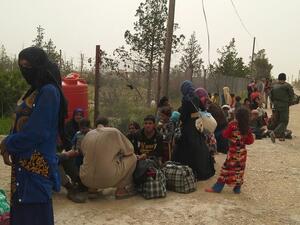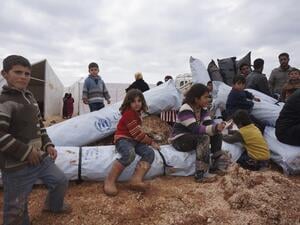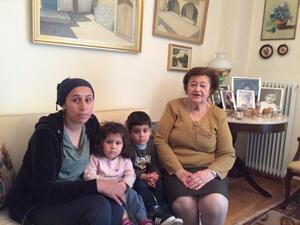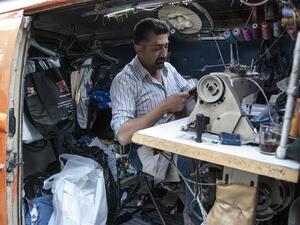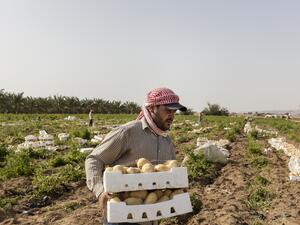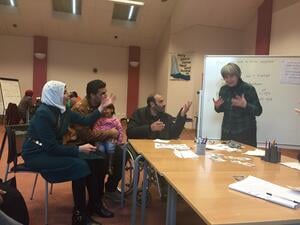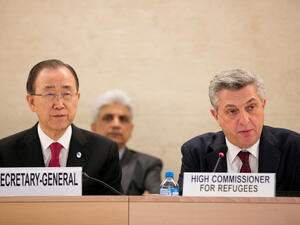Syrian refugees find safety in Lebanon, but shelter proves scarce
Syrian refugees find safety in Lebanon, but shelter proves scarce
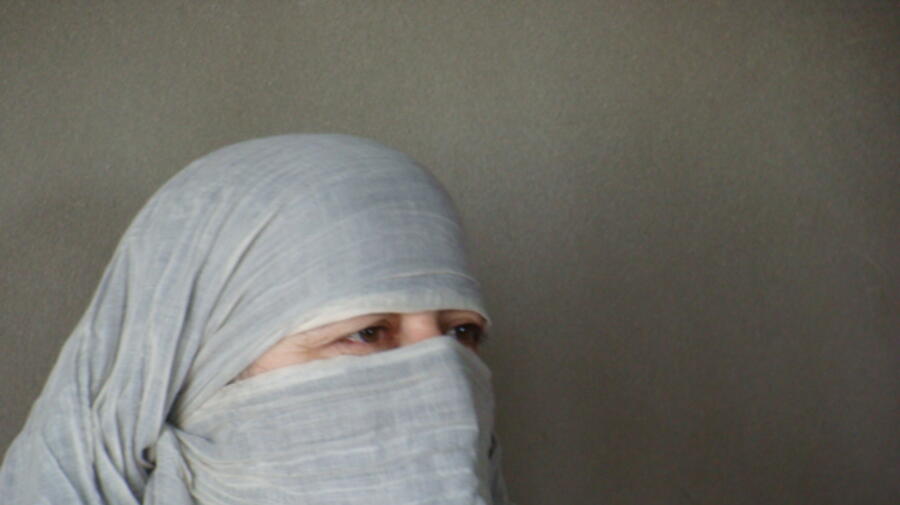
Om Ali and her family had difficulty finding somewhere to shelter when they reached Lebanon.
BEKAA VALLEY, Lebanon, September 25 (UNHCR) - After an overnight trek through the mountains, Om Ali arrived exhausted earlier this month in a small town near Lebanon's border with Syria. The mother of four from the city of Homs thought that her family, and those travelling with her, had finally found a place to rest: a half-built house with no water, but a decent roof, and no shellfire to keep the children awake at night.
When the landlord arrived the next morning, however, he told the group to move on. "We arrived yesterday and we found a place, but now we have to leave," Om Ali told UNHCR hours later. "I am tired. We are all tired." A small boy slept in the corner as she spoke. "We don't know where we are going."
Om Ali is not alone. In Lebanon, finding adequate shelter for Syrian families fleeing the conflict is the biggest challenge now facing international aid agencies like UNHCR. More than 70,000 Syrians have sought refuge in Lebanon over the past 18 months. That number could double in coming months if fighting continues and current planning projections are borne out.
Each day, new families arrive. UNHCR and its partners are working closely with local authorities to find places for them to live and to ensure they are safe and secure. With winter on the horizon, it is a race against time.
"The biggest problem facing refugees in Lebanon now and in coming months is shelter," said Anna Leer, a senior protection officer with UNHCR in Tripoli. She and others note that while efforts are being made to address the problem, the shelter needs of individual families often must be handled case by case. Adding to the complexity, Syria's refugees are scattered across wide areas in northern Lebanon and the Bekaa Valley as well as in urban locations.
Until now, many new arrivals have found accommodation with host families (especially in northern Lebanon, where family ties between Lebanese and Syrians across the border are strong), in apartments and rooms to rent, or in collective shelters such as schools. A minority are staying in tents or shelters of their own making.
As the Syrian crisis drags into a second year, many families who had been willing to host new refugees have run out of room or are no longer able to take people in. The rental market in some municipalities is becoming saturated, and apartments are almost impossible to find. Rents are rising - up to fourfold in some areas of the Bekaa - while Syrians with no work are going into debt or risking eviction.
Some schools in the Bekaa Valley that had been available for refugees during the summer holidays are being cleared out to make room for students as the new school year begins. About 100 families are losing their temporary homes and most have had to be relocated as a result.
"This is a serious problem in Lebanon that we are facing," said Sheikh Deeb Abed el Khalid, head of Keras al Kir, a local NGO that has been organizing shelter in schools. He worried that families would not be able to find adequate shelter as the seasons change. "It's going to be a tough winter here in the mountains."
A grandfather living with his extended family in a single apartment in Tripoli said he had no way to pay the rent. A farmer from a region near the Syria-Lebanon border, he is expecting more relatives to arrive. "We have to find help with the rent or we will die," he said. Other refugees who had been able to afford a place to stay, hoping that the war would end soon, are facing a new reality.
"I'm worried about what will happen if the situation continues and we have to stay away from our country," said Yusra, a refugee from Homs who is living in Lebanon with her five children. "How will we survive and continue here, I don't know! Every day I hope that we're going back, that tomorrow the guys will finish this war and we'll go back home."
UNHCR and its international partners, together with local authorities and NGOs, have been working hard to find new places for refugees to stay. They are identifying and refurbishing collective shelters, usually abandoned government buildings.
Twenty seven collective shelters have been renovated so far. The Norwegian Refugee Council is providing materials and labour to help winterize private homes in the Bekaa Valley. And about 60 locally sourced, pre-fabricated "box" houses, each costing US$2,500, are being set up by UNHCR and the Danish Refugee Council (DRC) in northern Lebanon for families who had been living in tents or unfinished homes.
To help ease the pressure on families paying rent, UNHCR and the DRC are also launching a cash-for-rent programme to help families afford the rising prices. UNHCR is discussing options with individual families seeking shelter and the agency is also exploring alternatives with local and national authorities.
For refugees like Sahar,* aged 25, who arrived on foot from the town of Al Qusayr, and is now living in a tent pitched in the shadow of a mosque, the solutions cannot come too soon. Her small children run around the dirt compound with bare feet, and she is afraid of scorpions. "I'm scared for the coming winter," she said, a cool wind already blowing down the mountainside. "It is much colder here than where I come from. I'm scared for my children."
* Name changed for protection reasons.
By Andrew Purvis in the Bekaa Valley, Lebanon

